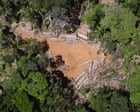
In a series of recent developments, countries across the globe are facing pivotal moments in environmental legislation and challenges to agricultural sustainability, highlighting the intricate balance between development and ecological preservation.
In Brazil, the legislative landscape has been dramatically altered with the passage of a new law, widely referred to as the “devastation bill.” This piece of legislation, which passed in congress by 267 votes to 116, has stirred significant concern among environmental activists and Indigenous communities. The new law aims to loosen environmental safeguards that have been in place for decades, potentially accelerating deforestation and affecting the livelihoods of those residing in ecologically sensitive areas. President of Brazil now has a 15-day window to approve or veto the bill, a decision that will be closely monitored by both national and international environmental organizations.
This legislative shift occurs amidst a backdrop of opposition from over 350 organizations and social movements who fear the long-term implications of reduced environmental oversight. The pushback against this bill underscores a broader dialogue on the balance between economic growth and environmental stewardship, a theme that resonates across the global stage.
Meanwhile, in the picturesque region of Savoie, France, local cattle farmers are grappling with an outbreak of contagious bovine nodular dermatitis, a disease that poses serious health risks to livestock. The disease’s progression has necessitated difficult discussions regarding the culling of affected animals to prevent further spread, a measure that has not been universally accepted. Farmers, supported by agricultural unions and a segment of the local populace, are expressing resistance to these culling measures, highlighting the deep-seated connection between farmers and their herds.
Efforts to contain the disease underscore the importance of veterinary science and biosecurity measures in maintaining the health of livestock industries. As the debate continues, it serves as a reminder of the delicate interdependencies between agriculture and public health, and the need for careful consideration of both economic and ethical factors in decision-making processes.
In a related sphere of environmental governance, Portugal is facing scrutiny from the European Commission over alleged inadequacies in addressing environmental obligations. If unresolved, this could lead to legal action by the European Union’s Court of Justice. The situation presents an opportunity for reflection and reevaluation of national environmental strategies within the framework of broader EU commitments.
The potential legal implications are a testament to the intricate compliance requirements that come with membership in multinational governance structures like the EU. This moment serves as a pivotal instance for Portugal to strengthen its environmental policies while reinforcing its commitment to collective ecological goals.
Taken together, these situations demonstrate the ongoing challenges and dialogues faced by countries around the world in their pursuit of sustainable development. They reflect a broader narrative of how nations are navigating complex issues involving economic growth, environmental protection, and community well-being.
These stories of Brazil, France, and Portugal serve as reminders that despite regional differences, the overarching quest for sustainability and resilience remains a unifying global theme. It emphasizes the importance of collaborative approaches and thoughtful leadership in addressing the environmental challenges that transcend national borders.
Through tranquil and informed discourse, communities both local and global can find innovative pathways forward, seeking solutions that honor the natural world while fostering economic vitality. By anchoring discussions in facts and shared values, we can craft a future that cherishes both people and the planet.
Source: {link}
